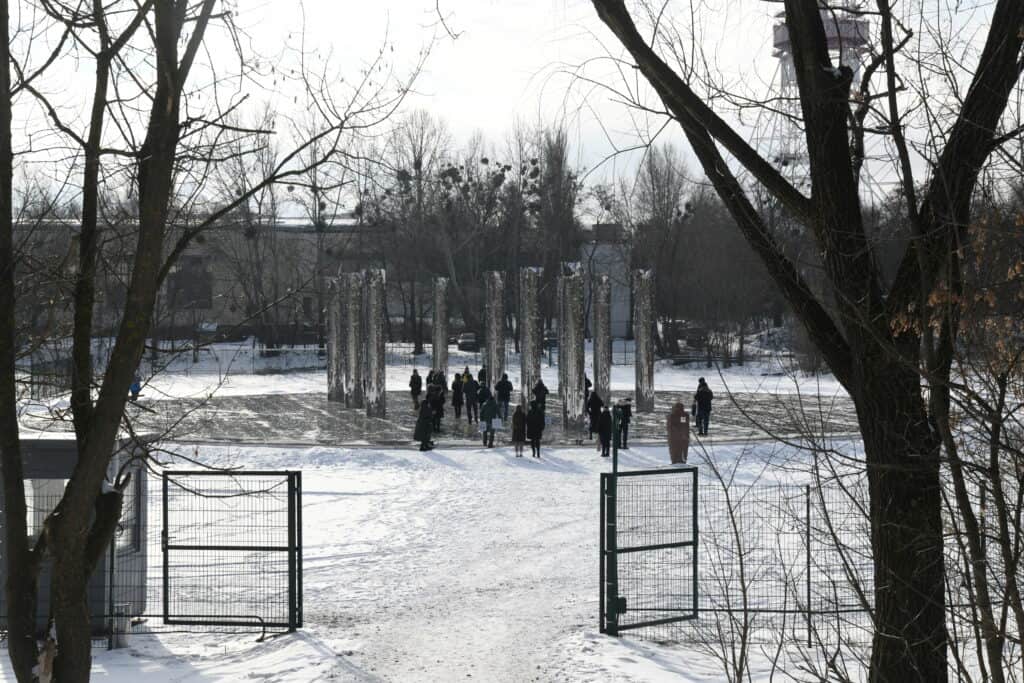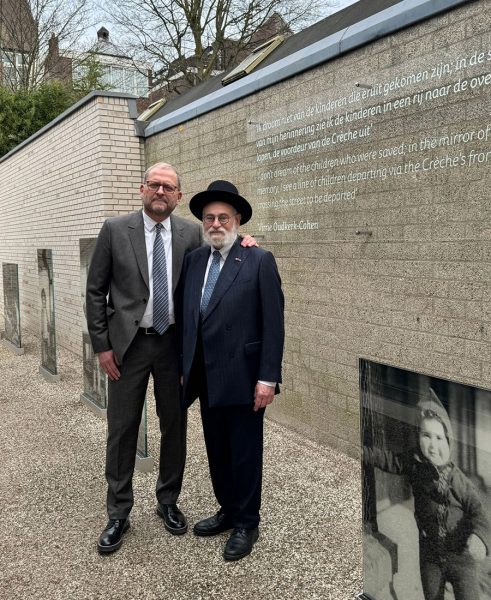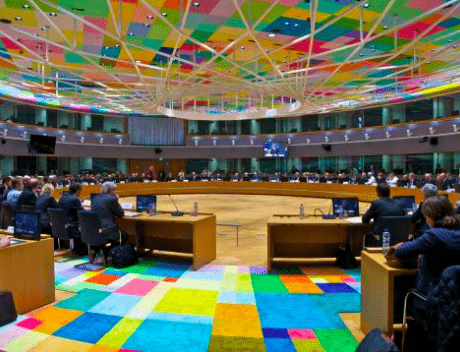
Yom HaShoah is when Israel and many diaspora Jews honour the memory of those who lost lost their lives in the Holocaust.
This year, given the extraordinary circumstances that we find ourselves in with the coronavirus outbreak, we are proud to help our partners at the European March of the Living in promoting their powerful and important plaque campaign.
Each of you can create your own plaque by clicking on the link here below that will be printed and placed on the railway tracks at the entrance to Auschwitz-Birkenau. You can do so here: https://nevermeansnever.motl.org/


En 1941, l’Allemagne nazie envahit l’Union soviétique. La Wehrmacht entre dans la ville de Kiev en septembre. Le 29, les occupants nazis ordonnent aux juifs de Kiev de se rassembler, avec leurs affaires personnelles. Ils sont emmenés près de ravins sur le site de Babi Yar. C’est là que le massacre commence. Les nazis les tuent avec des fusils. Babi Yar reste l’un des massacres les plus emblématiques de cette ” Shoah par balles “. En deux jours, les nazis exécutent près de 34.000 juifs. Leurs corps sont jetés dans les ravins.
Après la Seconde Guerre mondiale, les autorités soviétiques occultent les massacres des juifs de Babi Yar. La situation n’évolue qu’après l’éclatement de l’URSS en 1991. Progressivement, des recherches sont menées en Ukraine avec des universitaires occidentaux et des associations juives.
Des monuments sont érigés à la mémoire des victimes. Et cette année, pour les 80 ans du massacre en septembre 2021, le nouveau centre de commémoration de la Shoah a publié une liste de noms de dizaines de soldats nazis qui ont participé à la tuerie.

“I stress time and again that most victims of ISIS are Muslims. And when a topper from our government said to me, when we were discussing anti-Semitism, that in the Netherlands today 98 per cent of anti-Semitism comes from Muslims living in our country, I pointed out to him that when 80 per cent of my family was murdered there was not a single Muslim to be seen in the Netherlands,” I wrote in my diary of 7 February. Let me add that the day after 7 October, I received a phone call from our minister of general affairs, Van Gennip, who asked interestedly how I was doing and told me that “both the Moroccan and Turkish communities in the Netherlands do not find the events of 7 October acceptable”.
Probably I am a little too naive, because as far as I know, no mosque or Islamic community has dared to publicly distance itself from the 7 October massacre. Yes, a number of befriended imams let out a sincere and condemning sound in a personal conversation (I will not mention their names here, to avoid getting into Islamic trouble), but the Islamic silence at the time and the anti-Israel demonstrations at the opening of the Holocaust Museum and the anti-Herzog call by two hundred mosques do not make me feel good and worry for the future of Jewish Holland. Where were those two hundred mosques immediately after October 7? And I dare even ask myself: is there any future for the Jewish community in my homeland?
And the Netherlands is my homeland! Through my father’s line, I am the fourteenth generation after Chief Rabbi Moses Uri Halevi, the founder of the Portuguese-Israelite Congregation in Amsterdam. His congregation made Amsterdam into Amsterdam, put the city on the map and thus made a gigantic contribution to today’s Mokum. This makes it all the more painful to see the anti-Israel demonstrations and the enormously rising anti-Semitism close to the place from which 46 thousand Amsterdam Jews were deported on the trams of the GVB in World War II to end up, via Westerbork, on the trains of our own Dutch Railways, finally via the chimneys of the crematoria in the extermination camps in the dark hole of oblivion.
I dare even ask myself: is there any future for the Jewish community in my homeland?
How was the official opening of the Holocaust Museum? King Willem-Alexander, the president of Israel, the president of Austria and the chairman of the German Bundesrat spoke impressive, well measured words. The music, the speech by my friend Emile Schrijver, director of the Jewish Cultural Quarter, the other speakers, the voices of survivors, the children and the master of ceremonies Petra Katzenstein. If I wanted to properly put into words the impression this unforgettable, historic day made on me, I would read a few lines without words.
Every word I would write would be one too many, because the opening, the ceremony, the togetherness transcended all words. It was a deeply emotional event. Words describe, but words also limit and so: not a word I can dedicate to it.
And yet something also went wrong, wrong. Throughout the happening, anti-Semitic protests were heard. While the speakers were not drowned out, the music remained audible, their roar was like false-sounding background music, which, while not distracting from the perfect programme, demonstrated how necessary the Holocaust Museum is. In my opinion, the emotional damage done to survivors present was not adequately taken into account. And although, thank God, I was born only after the war, I too felt brutalised by the shouting crowd. I cherish freedom of speech, but the bestial manner in which I was shouted at, and with me so all those who came outside the Snoge, I find unacceptable. I do not understand why this was tolerated. The location from where the chanting was carried out was also painful: Waterloo Square, the source of Jewish life in the Jewish quarter at the time!
During the ceremony, fortunately I had my phone set to ‘do not disturb’, as a number of calls had come in from enraged Jewish people who, I later learned, found it unacceptable that protests were allowed and guests were allowed to be booed as they left the Snoge. At the amazing lunch at the Jewish Museum and especially when touring the Holocaust Museum, I was able to provide a lot of pastoral care. Many felt deeply hurt and abandoned … Yet, the feeling of gratitude and joy that this great monument was officially opened prevailed with everyone.
I cherish freedom of speech, but I find the bestial way I was called names unacceptable.
With this afternoon’s anti-Semitic roar still buzzing in my ears, I watched the documentary on the Jewish Council. It won’t be too bad, it was thought at the time. And so the Jewish Council was established. How do we view the growing anti-Semitism in 2024? Will it not be too bad?
But I must stop now to pack my suitcase and then quickly go to bed. Tomorrow at six o’clock the taxi will arrive and I will be on the plane at ten to eight on my way to Oporto for a three-day conference on kashrut. I hope and expect to learn a thing or two there. Keynote speakers from the rabbinical world, experts on kashrut, will give the speeches. I also have to speak, but what and where is not quite known yet. Probably at the unveiling of the monument being unveiled there in memory of the victims of 7 October.
And meanwhile, I float between my bed and the documentary on the Jewish Council, meet the grandsons of Asscher and Cohen, the chairmen, and wonder whether I am alarmist or realist. Cohen’s grandson fights with me against rising anti-Semitism. I don’t feel myself more unsafe than usual, but anti-Semitism is getting closer … am Jisraeel chai!

Following up on the videoconference on 10 March 2020 between European Council Members, as well as the ECB President, the Eurogroup President and the High Representative, the Eurogroup held an in-depth discussion today, together with non-Euro Area Members, on how to respond to the extraordinary human and economic crisis caused by the Corona virus.
The Eurogroup expressed its sympathy and solidarity with the citizens and the Member States particularly hit by this crisis and its gratitude to those risking their own health to save lives. The Eurogroup is following the situation very closely and is in permanent contact and coordinated to give a strong economic policy response to the exceptional situation. Our commitments of today reflect our strong determination to do whatever it takes to effectively address the current challenges and to restore confidence and support a rapid recovery.
Today, we welcomed all the measures taken by Member States and by the European Commission, in particular those taken to ensure that health systems and civil protection systems are adequately provided for to contain and treat the disease, preserve the wellbeing of our citizens and help firms and workers that are particularly affected.
Facing these exceptional circumstances, we agreed that an immediate, ambitious and co-ordinated policy response is needed. We have decided to act and will respond swiftly and flexibly to developments as they unfold. We will make use of all instruments necessary to limit the socio-economic consequences of the COVID-19 outbreak. We have therefore put together a first set of national and European measures while setting a framework for further actions to respond to developments and to support the economic recovery. Preliminary estimates of the European Commission show that total fiscal support to the economy will be very sizeable. We have, so far, decided fiscal measures of about 1% of GDP, on average, for 2020 to support the economy, in addition to the impact of automatic stabilisers, which should work fully. We have, so far, committed to provide liquidity facilities of at least 10% of GDP, consisting of public guarantee schemes and deferred tax payments. These figures could be much larger going forward.
The following measures are part of our co-ordinated responses to protect our economies.
1. All national authorities will allow automatic stabilisers to function and in addition implement all necessary measures to ensure that the economic consequences of COVID-19 are tackled and that they do not put in danger our economic and social achievements. To the extent required by the evolving situation in each country, they will implement temporary measures such as:
2. Coordinated efforts at the European level will supplement national measures:
3. Beyond the immediate, targeted response, we are working on all the necessary measures, to help the economy recover once the coronavirus has receded. We acknowledge the need to reflect on the resilience of our European strategic value chains to better protect Europe from product and capital market disruptions in the future. We have already significantly strengthened our crisis management framework, including with the establishment of the ESM. Today we recommit to continue our work to further strengthen the architecture and resilience to shocks of the Economic and Monetary Union.
Our shared rules will support this response. In particular, we discussed the application of the SGP, state aid rules and prudential rules:
We will take whatever further coordinated and decisive policy action is necessary, including fiscal measures, to support growth and employment.
It’s a challenging time for Jewish communities in Europe. Anti-Semitism is on the rise as populism and the politics of the lowest common denominator are gaining traction. Our communities often need round the clock protection and our practices and customs such as keeping Kosher are under pressure from increasing political interference.
| Cookie | Duration | Description |
|---|---|---|
| cookielawinfo-checkbox-analytics | 11 months | This cookie is set by GDPR Cookie Consent plugin. The cookie is used to store the user consent for the cookies in the category "Analytics". |
| cookielawinfo-checkbox-functional | 11 months | The cookie is set by GDPR cookie consent to record the user consent for the cookies in the category "Functional". |
| cookielawinfo-checkbox-necessary | 11 months | This cookie is set by GDPR Cookie Consent plugin. The cookies is used to store the user consent for the cookies in the category "Necessary". |
| cookielawinfo-checkbox-others | 11 months | This cookie is set by GDPR Cookie Consent plugin. The cookie is used to store the user consent for the cookies in the category "Other. |
| cookielawinfo-checkbox-performance | 11 months | This cookie is set by GDPR Cookie Consent plugin. The cookie is used to store the user consent for the cookies in the category "Performance". |
| viewed_cookie_policy | 11 months | The cookie is set by the GDPR Cookie Consent plugin and is used to store whether or not user has consented to the use of cookies. It does not store any personal data. |